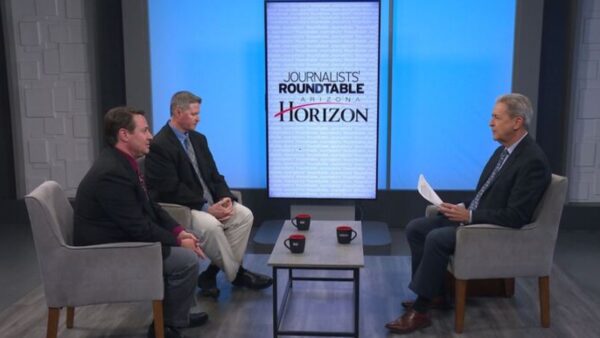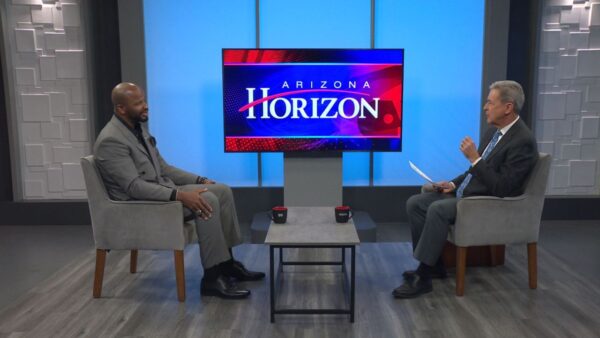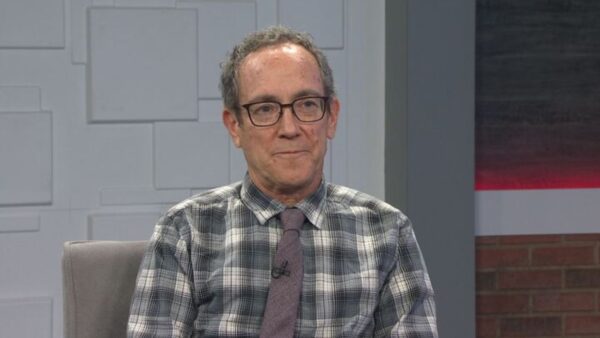It’s been 20 years since the North American Free Trade Agreement was put into place. It was designed to eliminate investment and trade barriers between the United States, Mexico and Canada. An international conference will be held at Arizona State University in March regarding NAFTA. Jonathan Koppell, Dean of ASU’s College of Public Programs, will discuss how the trade agreement has impacted Arizona and the three countries it covers.
Ted Simons: The North American Free Trade Agreement went into effect 20 years ago as a way to eliminate investment and trade barriers between the United States, Mexico and Canada. An international conference examining the impact of NAFTA will be held later this month at ASU, and joining us now is Jonathan Koppell, Dean of ASU's College of Public Programs. Good to see you again and thanks for joining us.
Jonathan Koppell: Thank you for having me, Ted.
Ted Simons: Before we get too deeply into this let's get some definitions, what is NAFTA?
Jonathan Koppell: Well, I think most people are familiar with NAFTA, which passed 20 years ago. The idea was to create a free trade zone between the United States, Canada, and Mexico. As you remember and was a controversial, a controversial move at the time, and the goal was to create are month flow of goods and services in North America.
Ted Simons: Have we seen a better flow of goods and services a, and b, have we seen some of the fears that were expressed 20 years ago realized?
Jonathan Koppell: Absolutely. There is, there has clearly been a dramatic increase in trade amongst the three countries. The question of, whether the fears have been realized is a difficult one to answer. You will recall Ross Perot talking about the giant sucking sound --
Ted Simons: Indeed.
Jonathan Koppell: From the south. That hasn't been realized in nearly the dramatic fashion that was envisioned. There has been some loss of jobs in the United States in that period. There's also been a gain of jobs. So it's very hard to figure out what the cause and effect is. There's been other things besides NAFTA in the last 20 years ago. Information technology, trade in other parts of the world and so on. It's a difficult thing to parse out.
Ted Simons: Is there a net loss of jobs and companies since the early 90's?
Jonathan Koppell: To Mexico?
Ted Simons: In the United States.
Jonathan Koppell: I think certain sectors have lost jobs. It's hard to pin NAFTA as the villain. Our trade with China and other parts of the world have dramatically increased in that period of time.
Ted Simons: So this border conference here, what exactly is the goal? What are you going to be talking about?
Jonathan Koppell: So, basically, the question is to assess NAFTA 20 years after the fact and say, what's worked and what hasn't? Ask some of the questions that you have asked. And ask some of the questions that are even really more practical. What's standing in the way of this working better? That is to say, I don't think anyone says we're turning the clock back. The question is what can make this work better.
Ted Simons: It seems like improving border access, talk to us about that, and how that has changed since NAFTA was implemented.
Jonathan Koppell: So, as you can imagine, the, as the increase in the flow of goods increased between the countries, the border access points have become stressed, so the question of how well our Arizona economy does in a NAFTA world has a lot to do with the efficiency of our border, and literally the logistics of moving stuff across a border. In the post-9/11 world, obviously, security becomes a greater concern, which creates another logistical hurdle. Among the issues we'll be talking about at the trilateral borders conference, it is March 17 and 18 at the Heard Museum, and you can get more information at trilateralborders.org. We'll be dealing with the practical considerations of better operating our border crossings, so that Arizona is getting its fair share of the trade with Mexico.
Ted Simons: Ok, and the immigration issue, the impact of immigration concerns on border access between the U.S. and Mexico, let's keep it between those two.
Jonathan Koppell: Right.
Ted Simons: Show down the process here? Speed bumps? What do you think?
Jonathan Koppell: I think that it creates complexity. You have to factor in border security when you are trying to, to speed the flow of goods and services. So, that does put the onerous on us to combine security and efficiency, and what we have seen is that this trade volume is key for Arizona. It's vital to, to the success of our state in the future, and right now to be honest, we have to pay catchup with states like Texas, which have invested heavily in infrastructure, and are consuming a larger share of the volume between the United States and Mexico.
Ted Simons: It sounds like Mexico has to play catchup, as well. The foreign investment in Mexico, and I was looking at this, the foreign investment in the U.S., $166 billion. Canada, $326 billion. And Mexico, it's only $13 billion. How do you get more foreign investment in Mexico?
Jonathan Koppell: Among other things, you invest in infrastructure in Mexico, which is exactly what they are doing. So, they are significantly increasing the infrastructure capacity in part, increasing their access to the United States. So, as I mentioned, with respect to Texas, they are building highways right now, their new infrastructure is all pointing at Texas. We need to, to get it pointed, to get it pointed at Arizona.
Ted Simons: And because, because aerospace looks like it could be a factor, between Arizona and, and Mexico. You have the oil industry, it seems like that's state run, so you don't know how sluggish that's going on. Can those things be freed up a bit so that again, that foreign investment in Mexico, if Mexico is a dynamo in, an economic dynamo, it has to help Arizona.
Jonathan Koppell: Absolutely. So, you hinted at the things that people are excited about in this relationship. That there is going to be greater trade liberalization, sorry, domestic liberalization, and that only amplifies the opportunity for Arizona businesses to export to Mexico. And Arizona exports have grown a lot in this NAFTA period from about $3 billion in 1996 to about $8.5 billion in 2012, and it's probably higher in 2013. Disproportionately, the growth in Arizona's exports is to Mexico and Canada.
Ted Simons: Yeah.
Jonathan Koppell: So, we are going to benefit as, as a Canadian economy grows and the Mexican economy grows, that's only going to help Arizona.
Ted Simons: And, and I noticed that a trans-Pacific trade deal could be in the works between NAFTA and, obviously, Pacific rim countries, and talk about the impact of something like that.
Jonathan Koppell: So, that, in some sense, that's the NAFTA 2.0, if you will, the trans-Pacific trade agreement, which would add a series of Pacific rim countries to, essentially, to NAFTA. That will open further the horizons for Arizona's trade.
Ted Simons: You mentioned Texas and the fact that we're behind the curve here. What -- if I'm a lawmaker, what do you tell me is going on in Mexico that I need to be aware of and that we can do better because of NAFTA is not going anywhere? How do we take better advantage of this agreement?
Jonathan Koppell: So Arizonans understand this, so our Morrison Institute did a study and asked Arizonans what they thought of international trade in the future of Arizona. Sixty percent said our capacity as a state to engage in international trade was critical to the state's future. So the question is what do we do as a result? And I think that part of it is the infrastructure that we already talked about. Part of it is making our businesses globally competitive. That does have to do with education and upgrading our facilities and our communications infrastructure and our technology infrastructure, and basically, creating a global mind set in Arizona. Many of our legislators and business leaders and our local elected officials have been eagerly reaching out to Mexico and Canada trying to build this relationship, so I think that, that Arizonans get it.
Ted Simons: All right, well, good stuff and good luck with that conference. We'll see you March 17 and 18.
Ted Simons: Got it in there, thanks.
Jonathan Koppell: Very good.
Jonathan Koppell:Dean, Arizona State University's College of Public Programs;




















